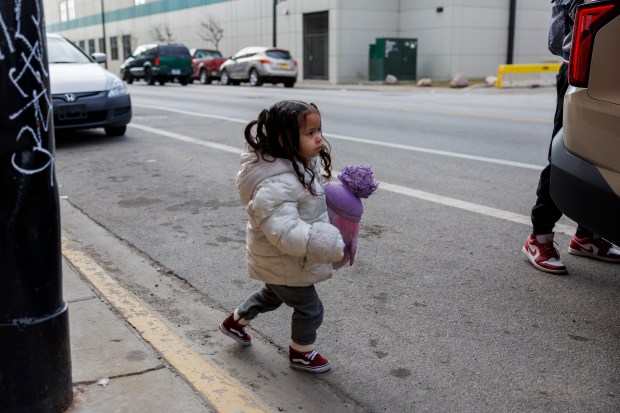On a recent Tuesday morning, a family of three packed up their duffel bags outside a migrant shelter on the Lower West Side en route to El Paso, Texas, where they said they had relatives waiting. They had been in Chicago for four months.
Moises Sanchez, 24, had been a barber in his home state of La Guaira, Venezuela. He had the word “family” tattooed on the back of his head behind his ear. He came to the U.S. through Laredo, Texas, with his wife and 2-year-old daughter for economic opportunity. The family was given bus tickets by Texas state officials to go to Chicago, but he struggled to find work the entire time he was here, he said.
“From the minute I arrived here, I wanted to leave. I didn’t want to stay in Chicago. It’s freezing,” Sanchez said Feb. 13. “I can’t stand the cold.”
At least 3,194 individuals have received financial support from the state of Illinois to reunite with friends and family in other states and U.S. cities since mid-November, according to state data provided to the Tribune on Feb. 14. The state has spent over $620,000 on travel tickets and taxi fares to airports, trains or bus stations to connect with family and friends, which city and state officials call “diversion and outmigration.”
“Using these funds to quickly connect new arrivals with their next step is significantly cheaper than moving people into shelters. The state plans to continue using funds in this way for the foreseeable future,” said Daisy Contreras, a spokesperson for the Illinois Department of Human Services.
The state could not provide specific information about migrants’ final destinations.
Due partly to the outmigration efforts, the number of migrants staying in city-run shelters has declined rapidly in recent weeks. As of Wednesday, the city reported there were nearly 12,400 residents in 24 active shelters run by the city, state and O’Hare International Airport, down from the more than 15,000 migrants staying in 27 city-run shelters at its peak in mid-December.
More than an estimated 35,800 migrants have arrived in Chicago since Texas Republican Gov. Greg Abbott began sending migrants to sanctuary cities like Chicago in August 2022, in part to protest federal immigration policies.
State and city officials have been struggling to come up with the funds to house thousands of migrants. In his spending plan unveiled Wednesday, Gov. J.B. Pritzker proposed spending an additional $182 million on the migrant response during the state budget year that begins July 1.
To manage new migrants arriving on buses, the state is set to officially open an intake center in six large tents at the landing zone at 800 S. Desplaines St., Matt DeMateo, executive director and pastor at New Life Centers, told the Tribune on Sunday.
Teams at New Life Centers work with Catholic Charities and the city’s Office of Emergency Management and Communications to staff the landing zone.
DeMateo said shelters were overwhelmed eight weeks ago, but it’s been quieter at the landing zone in recent weeks.
He said migrants who arrive are given a jacket, hat and “whatever they need physically.” Officials then talk to migrants about the “path forward,” informing them there’s no state rental assistance available for those who arrived after Nov. 17.
“Catholic Charities will pay for the flight or train ticket or whatever to anywhere in the country,” he said. “If they have family here or friends or somebody they can stay with, we tell them go there and we’ll get them an Uber or Lyft.”
Sanchez’s wife, Nivole Tavar, said the state helped them buy tickets to leave. She wore a bow in her hair as she gathered their luggage together on the sidewalk outside the shelter.
“Over there, the economy is really bad,” she said about her home country. “But El Paso is better than here.”
The family walked past babies crying in strollers, balancing their belongings in their arms.
Antonella Sanchez, 2, loaded her stuffed animal unicorn into the back of a Kia Uber. They put their bags in the car and rode away.




